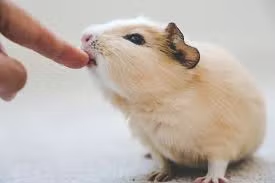Understanding the Reasons Behind Guinea Pig Biting and How to Prevent It

Features Editor: Ravi Teja Mandapaka
Guinea pigs, popular small pets for children and adults, are known for their gentle nature. However, occasionally, they may exhibit biting behavior, which can be perplexing, especially for young pet owners. Understanding the reasons behind guinea pig bites and how to prevent or address them is essential to avoid accidental injuries and enhance the bond between you or your child and the furry companion.
Why Do Guinea Pigs Bite?
Guinea pigs are highly social animals that communicate using vocalizations and experience various emotions. Biting may occur for several reasons:
- Feeling Scared: When guinea pigs feel scared, are startled, or face intimidation from other guinea pigs, they may resort to biting as a defense mechanism. This is their way of protecting themselves or stopping the source of their fear, such as being held too high, having their food stolen by another guinea pig, or being disturbed while sleeping.
- Feeling Hungry: Guinea pigs are enthusiastic eaters with their favorite foods. If they are exceptionally hungry or involved in a food dispute, they might nip at you or another guinea pig. This behavior is typical of any hungry animal, but measures can be taken to minimize it.
- Accidental Biting: If your guinea pig detects the scent of food on your fingers or you are holding a chew toy, it may accidentally bite your fingers, mistakenly thinking they are the chew stick or a snack. Typically, they realize their mistake as soon as contact is made.
- Feeling Stressed: Guinea pigs can experience stress from various factors, including living in cramped cages, lacking a proper sleeping place, constant competition for a mate or food, and an uncomfortable cage floor. Stress can heighten their reactivity and the likelihood of biting.
- Teeth Maintenance: Guinea pigs continuously grow teeth throughout their lives, so they require items, like hay, to chew on to keep their teeth in check. If they lack appropriate things to chew, they may gnaw on anything they can find, including you.
- Feeling Sick: Unwell guinea pigs are more prone to biting. They might resist handling and use biting to communicate their discomfort. If a guinea pig that hasn't bitten before suddenly nips at you, it could indicate illness.
- Feeling Pain: Pain can trigger biting behavior, whether due to sickness or injury. Squeezing too tightly, limbs getting stuck in the cage, injuries, or other sources of pain can lead to biting.
- Hormones: Puberty affects male guinea pigs at around two to three months, increasing testosterone levels and potential aggression. If two male guinea pigs are housed together, they may bite each other or become more likely to bite you. Keeping intact males separated is advisable. Female guinea pigs may also become less sociable and tolerant of handling during their heat cycle.
How to Prevent Guinea Pigs From Biting:
To deter your guinea pig from biting, consider the following:
- Ensure your guinea pig's enclosure is adequately spacious.
- Provide hiding spots and an ample supply of food.
- Avoid waking a sleeping guinea pig.
- Offer plenty of chew toys to satisfy their need to gnaw.
- If you suspect sickness or pain, minimize handling and consult a vet.
- Separate guinea pigs if one is bullying the other persistently.
__________________________________________
About Author
Ravi Teja Mandapaka is a multifaceted scholar, poet, and passionate advocate for animals. From English literature to agricultural sciences, from field hockey to music and the arts, Ravi's diverse interests converge in his unwavering commitment to animal welfare. He believes in a journey where compassion meets creativity, and academia blends with advocacy.
 https://www.linkedin.com/in/ravimandapaka/
https://www.linkedin.com/in/ravimandapaka/


